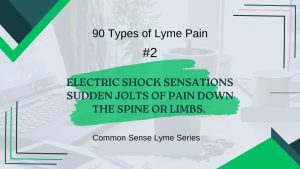Call for your appointment today 914-666-4665 | Mt. Kisco, New York

Researchers identified azlocillin after screening nearly 8,000 drug compounds. They found that in the test tube and in mice, azlocillin was effective against drug-tolerant Borrelia burgdorferi s.s., the pathogen causing Lyme disease. But will late stage Lyme disease treatment soon include azlocillin, an FDA-approved drug that is often used to treat infections such as Pseudomonas aeruginosa and Escherichia coli? Stanford researchers say that is what they are working towards.
“This compound is just amazing,” says Rajadas, senior author of the study. “It clears the infection without a lot of side effects. We are hoping to repurpose it as an oral treatment for Lyme disease.”
Chronic Lyme disease
Unfortunately, treatment fails for too many patients with late stage Lyme disease. Multiple studies have shown that as many as 34% to 62% of patients have Lyme disease symptoms that persist long term despite treatment.
In fact, one study found that at their six-month follow-up visit, “36% of patients reported new-onset fatigue, 20% widespread pain, and 45% neurocognitive difficulties.”
When late stage Lyme disease treatment fails, chronic symptoms may be due, in part, to what scientists call ‘persisters,’ bacterial cells that are resistant to antibiotics.
“This compound is just amazing,” says Rajadas, senior author of the study. “It clears the infection without a lot of side effects. We are hoping to repurpose it as an oral treatment for Lyme disease.”
“These studies reveal that a small subpopulation of dormant B. burgdorferi persisters still survives with current Lyme therapy antibiotics,” says Pothineni and colleagues in the article, “Azlocillin can be the potential drug candidate against drug-tolerant Borrelia burgdorferi sensu stricto.” [1]
“The probable mechanisms as evidenced by scientific literature are the persister formation, evading the immune system by hiding in the privileged sites, surface lipoproteins modifications to avoid antigenic responses, biofilm formation, and immunomodulation,” explains Pothineni.
Azlocillin in mice
The authors inoculated mice with high doses of Borrelia burgdorferi (Bb) to test the effectiveness of each of the antibiotics. Doxycycline cleared the infection on Day 7 but did not clear the Borrelia bacteria at Days 14 and 21. Cefotaxime alone failed to eradicate the B. burgdorferi infection completely in mice who had been infected for 7 and 14 days.
Meanwhile, azlocillin completely cleared the infection in all mice but some B. burgdorferi DNA remained.
“Though the azlocillin eliminated B. burgdorferi infection completely in all the mice infected for 21 days, still 2 of 8 mice infected for 14 days had some B. burgdorferi DNA in ear tissues,” says Pothineni.
[bctt tweet=”Study finds azlocillin may be a game-changer for the treatment of persistent Lyme disease symptoms. ” username=”DrDanielCameron”]
The authors points out, “the drug combinations of 40 μg/ml azlocillin and 80 μg/ml cefotaxime is much more effective in killing persisters than using azlocillin alone.”
Treatment for patients
Unfortunately, treatments that are successful in the test tube and in mice, may not work in humans.
Azlocillin is a semisynthetic β-lactam drug that cannot be used in patients who are allergic to penicillin. Currently, it is only available intravenously and the dosage, duration, efficacy, and side effects in B. burgdorferi-infected patients has not been studied.
For now, there are a number of antibiotics that are better understood including oral doxycycline, amoxicillin, cefuroxime, cefdinir, azithromycin, and clarithromycin, as well as intravenous ceftriaxone and cefotaxime. And specific drugs are available to target tick-borne co-infections, such as atovaquone and azithromycin for the treatment of Babesia.
Lastly, medications, which have recently been studied in the laboratory or in mice are now being considered as late-stage Lyme disease treatment options. These include dapsone [2], a combination of daptomycin, ceftriaxone, and doxycycline [3-5], and disulfiram. [6]
Related Articles:
Case report: Persistent pain and fatigue after treatment for Lyme disease
Could ketamine help manage pain for post-treatment Lyme disease syndrome?
References:
- Pothineni VR, Potula HSK, Ambati A, et al. Azlocillin can be the potential drug candidate against drug-tolerant Borrelia burgdorferi sensu stricto JLB31. Sci Rep. 2020;10(1):3798.
- Horowitz RI, Freeman PR. Precision medicine: retrospective chart review and data analysis of 200 patients on dapsone combination therapy for chronic Lyme disease/post-treatment Lyme disease syndrome: part 1. Int J Gen Med. 2019;12:101-119.
- Feng J, Li T, Yee R, et al. Stationary phase persister/biofilm microcolony of Borrelia burgdorferi causes more severe disease in a mouse model of Lyme arthritis: implications for understanding persistence, Post-treatment Lyme Disease Syndrome (PTLDS), and treatment failure. Discov Med. 2019;27(148):125-138.
- Wozel G, Blasum C. Dapsone in dermatology and beyond. Arch Dermatol Res. 2014;306(2):103-124.
- Gonzalez-Ruiz A, Seaton RA, Hamed K. Daptomycin: an evidence-based review of its role in the treatment of Gram-positive infections. Infect Drug Resist. 2016;9:47-58.
- Liegner KB. Disulfiram (Tetraethylthiuram Disulfide) in the Treatment of Lyme Disease and Babesiosis: Report of Experience in Three Cases. Antibiotics (Basel). 2019;8(2).




So happy that people in and out of the medical field have finally admitted Lyme is not cured after IV antibiotics. My poor husband has suffered from chronic Lyme for 10 yrs. and has been subjected to cruel and unnecessary criticism from many doctors, often being told to go and see a psychiatrist, it was all in his head, well considering it took a year to arrive at a diagnosis, at which time it had traveled to his CNS and has caused cognitive impairment, you might say it is in his head. 30 days of IV did not eradicate the damage.
I’m told same thing. Doctors tell me it’s all in my head
5 years so far for me. My symptoms are mostly neurological
I’m told same thing. Doctors tell me it’s all in my head
5 years so far for me. My symptoms are mostly neurological
Doctors tell that it is in your head, because they do not know what is the problem. Many MDs are not educated how to detect and treat Lyme and co-infections. You have to be your own doctor, otherwise it is very nasty and deadly disease.
I agree, never had iv but any antibiotics have never helped. Only made worse.
In 1984 I was walking through a meadow in the county of Mendocino to avoid the manzanita because of all the ticks. All at once I felt an extreme itching on my left ankle so I sat down, pulled my pantleg up and my sock down and there were two tiny little ticks stuck on my ankle about 2 inches apart. I said well I’ll be darned, I’m not safe anywhere from these things. There was a red rash and for over 6 months after starting out with the flue like symptoms I was nauseated. It went from nausea to pain in the joints and vision trouble…tunnel-vision and temporary loss of vision in one eye. After surviving and getting somewhat better but not completely free of symptoms, while living in Hawaii, I went to a neurologist. He said they didn’t have Lyme disease in Hawaii. I tried to explain about airplanes and timeframes but he was convinced that Lyme disease was not there and it was rare anywhere else. At this point in my life I have had two Western Blot tests and one other kind. Both kinds showed negative. I have a feeling that I’m going to die with this disease. What is the best test for chronic Lyme and what is the best treatment?
Some of my patients never test positive for a tick-borne illness. There are a number of treatments. I also arrange for consultations to look for other illnesses.
Drop alcohol, sugar, and breads. Take vitamin c , zinc. Avoid stress. Stay in the sun. Wish I could. I tolerated 1989 Ehrlichia infection well without knowing I had Lyme. Got an unrelated penicillin shot in 2005, the herx and inflammation have never let up. Tried treating with heavy oral antibiotics off and on without any results. I think they made me worse. Even iodine based x ray dye for CT scan sends me into massive herx. Amazing. Retinal eye issues with dry eye and virus Epstein barr are doing well in me. Retinal specialist says eyes are fine. Have vitreal detachments and colored permanent artifacts always in the same spots of both eyes now. Since antibiotics have never helped in any way, I’m just trying to keep health in check. Dropped beef for ehrlichia after juicy red steak caused ganglion cysts appearing hours after eating a juicy red steak. After dropping beef the cysts all disappeared. But dropping all red meat for a year hasn’t helped given that I’ve had ehrlichia since 1989. Will be doing some hiking this spring while I still have my eyesight. Maybe get my bucket list rounded out while I still can.
Seek a lyme specialist
Is there any update on the efficacy of Azlocillin in humans? If this drug was already FDA approved for one illness, will it have to be re-approved for Lyme? Any chance there will be clinical trials in NY?
I have not seem any humans. The authors of the first study did not include people. The authors suggested the need for a pill version.
When does he plan to start human clinical trials?
Are there any study’s taking place for volunteers? I have been battling Lyme’s for 8 years now and just can’t beat it.
I have not heard of any study taking volunteers. I would encourage you to take my Lyme disease and COVID-19 survey to understand the virus or vaccine. You can participate even if you have not had the illness or taken the vaccine. https://danielcameronmd.com/lyme-disease-covid-survey/
I’ve had chronic lymes for 32+ yrs and would be very happy to be part study and very greatful
I have not seen a azlocillin trial, yet.
As a LONG TIME Late Stage Lyme sufferer who had multiple bullseye rashes on my stomach in 1986 , I had never heard of Lyme Disease in the 80’s so I didn’t go to a Doctor until 10 years later because my then 34 year old body felt like it was 140 , I would try just about ANYTHING right about now
Greg. Do you have any eyesight problems. Retinal detachment, PVD s vitreal detachments. (strands of retina coming loose). For example I have the Octopus floater arms, but I have colored spots that never move in the periphery of both my eyes. They are visible when I blink, but do not obstruct vision. I have Lyme A + Ehrlichia since 1989. Never treated but tolerated well unknowingly, until penicillin shot then hard PTLD that has never for almost 16 years. Now eye problems.
Greg, can you tell me more about your PVD. I may have the same.
Azlocillin has been discontinued
Yes. I am hoping for new treatments for my patients that are struggling to get better.
Hi Dr. Cameron,
I’ve been looking around online and can’t find any new information about Azlocillin. The Stanford researchers were showing such amazing results against Lyme, but what happened? It doesn’t look like anything came of this treatment. I don’t see any new information over the last two to three years. Have you heard any updates? Or did a better treatment come along that they’re trying to get out? Thank you!
I don’t have any new information on Azlocillin. I had also been waiting for a breakthrough
Dr Cameron, I certainly hope this new drug azlocillin comes out soon.
As for so many, my life has been on hold for 14 years. Ive done just about everything I can think of or find out about. I have led Lyme support meetings and helped others as I can. But my family has 3 members with chronic lyme, and it has really messed up our lives. Tragedy has been waiting around every corner.
Id gladly join a trial of azlocillin. Im about as detoxed as I can be. The biggest difference for me has been heavy metal chelation. In fact, I found that even small amounts of DMSA can disrupt the biofilm formation in a bigger way than antibiotics has ever done.
Now I mostly take mother wort., enzymes, DMSA, ALA and a few others supplements. I stopped taking the imported herbs that were contaminated with metals. And it has worked out ok. But any drop of sugar or carb sends me backwards.
WE need that Azlocillin!
As a LONG TIME Late Stage Lyme sufferer who had multiple bullseye rashes on my stomach in 1986 , I had never heard of Lyme Disease in the 80’s so I didn’t go to a Doctor until 10 years later because my then 34 year old body felt like it was 140 , I would try just about ANYTHING right about now
Please let us know as soon as Azlocillin trials are available.
Please let us know as soon as Azlocillin trials are available.
I was diagnosed with lyme disease nearly 35 years after the onset of illness and symptoms. It is a tragic scenario that plays out everywhere. I finally got the brain scans, blood tests and treatment I needed (out of pocket of course), but the antibiotics failed miserably. I retested a few years later and I still have it. I have learned to live in a state of suffering and rejoice in the Lord! I have zero hope in any of the current treatments. It is the same with cancer. They will not release the cure. “They” want you sick and spending money. It is just the way it is. Put your hope in the Lord and look up! He is returning soon. Forget the “wisdom of man”…and seek the righteousness of God.
Amen Tara. I’ve only be suffering for 8+ years but as you know that’s 8+ years too much. I wish there were more awareness to our suffering. But in the meantime, our Lord knows our every suffering and is going to bring us home soon. God bless you in your health journey!
Recently diagnosed with Lyme Disease that shattered my life 5 years ago. Sought countless physicians including the Mayo clinic and received the same results. “Tests are negative, must be chronic fatigue” which is the polite way of saying, “it’s all in your head”. Saw a Dr. in Seattle who ran the proper tests that insurance doesn’t cover and found high levels of mold along with positive Lyme. Azlocilin used to be prescribed in the US so I’m curious why it stopped being used since it’s FDA approved. I know the bottom line is money because it’s always the bottom line, but I’d love to know if there’s a way to be notified as soon as it’s available even if only in clinical trials. Thanks and keep doing good work.
I have not seen any Azlocillin trials in the US. I have had to use treatments for now. Sorry.
My daughter has been suffering with lyme disease for years. She is a nurse but hasn’t been able to work for 4 years. She has been on an antibiotic protocol. Please let me know if this drug becomes available. Thank you!
It is available outside of the U.S. (Germany comes to mind).
My case began in 1988. Had an accident at work. Back and neck injuries. But I was young and strong. I had just moved Upstate NY, had 1st child. Never saw the tick or had a rash. Went downhill for a year and a half till I was diagnosed. I went through Rocephin treatments, massive antibiotics, etc. for about eight years until I recovered enough to go back to work. Staying dormant in me for a number of years. I worked hard as a bus mechanic for years. I went for pain management. I received an epidural steroid. It triggered the bacteria in my body to Full Blown Lyme symptoms the next day! Had to retire from work.
Almost died at home. Finally was treated at a Lyme literate doctor with bicillin injections. 6 months later, back to work. I’ve had NUMEROUS other treatments since (including Dapsone which did nothing for me) and I am currently suffering again. Woe is me.
After 35 years of living in pain and all the drama associated with it, I would gladly volunteer for a study. Please keep me updated and consider me a great test subject. Thank you and bless you helping others.
I have not heard of any clinical trial for azlocillin.
So why isn’t the great doctor Cameron busy writing this script for all of this patients that’s the real question
Unfortunately, azlocillin is not on the market in the US. Once available, we need trials to determine whether the benefits of azlocillin are not just seen in the lab.
Thank you sir great work .
I have been disabled by illness for 30 years. I have two positive Western Blot tests from 10 years ago. Not one of the several health care systems even acknowledge Lyme. Not even the U of WA. I’m on SSDI and Medicare, as well as food stamps. I can’t even pay rent without help, how can I get accurate/quality healthcare for Lyme when it seems that all the nation’s top Lyme docs only accept cash and can cost $1000 for an appointment? There are a couple Lyme M.D.s near or in Seattle, but I cannot afford any of them or their treatments. What are we poor people to do?
Stupid doctors I want to know when this new antibiotic will be available as nothing so far has worked
Has any one tried Hyperbarics?
Has ticarcillin-clavulanate and piperacillin-tazobactam, been tested or used for latent Lymes Disease, please advise!!!!!!
No trials
Do we know if Azlocillin is available for human use in other countries? If so, where? Thank you…
Azlocillin is available in China and Germany (limited), so says the internet sleuthing I’ve done. Even so, I have not figured out how to get it, even though I would be willing to go to Germany.